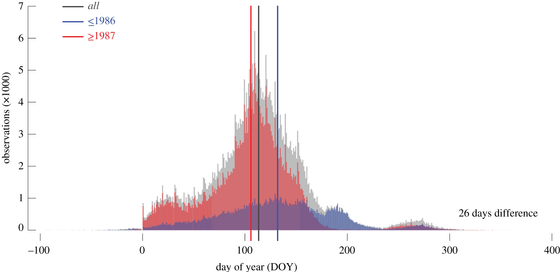It turns out that British plants bloom 'one month' earlier than in the 1980s, and the pollen season may be extended.

In Japan, it became a hot topic in 2021 that the cherry blossoms in Kyoto
Plants in the UK flower a month earlier under recent warming | Proceedings of the Royal Society B: Biological Sciences
https://royalsocietypublishing.org/doi/10.1098/rspb.2021.2456
UK plants flowering a month earlier due to climate change --ScienceDaily
https://www.sciencedaily.com/releases/2022/02/220201201102.htm
Flowers in The UK Are Blooming a Whole Month Earlier Than They Did in The 1980s
https://www.sciencealert.com/flowers-are-blooming-a-whole-month-earlier-in-britain-than-they-did-in-the-early-80s
It is clear from observational data that the world's temperature continues to rise, but its impact on the natural environment is difficult to quantify. Therefore, a research team led by Professor Wolf Buntgen of the Faculty of Geography, University of Cambridge, identified and analyzed 419,354 data on the first flowering of 406 species of British plants recorded between 1753 and 2019.
The results show that the average flowering date for plants in the United Kingdom in 2019 is April 2, almost a month earlier than before 1986. Below is a graph showing that. Comparing the bar graph (blue) showing the first flowering date from 1753 to 1986 with the bar graph (red) after 1987, the difference between the average first flowering dates was as much as 26 days.

Britain's warming is changing the amount of rainfall and meltwater, which are important factors for flowering. As a result, plants such as annuals, which change generations relatively quickly, are trying to respond to climate change by blooming early, but they may not be able to keep up with the rise in temperature. 'It's unclear if plants will adapt and evolve so quickly that they can catch up with climate change and bloom at the optimal time,' the researchers said.
According to the research team, if the temperature continues to rise, it is quite possible that the average flowering date of British plants will shift to March. If this happens, crops that sprout too early may be damaged by freezing and frost damage, reducing yields and extending the pollen allergic season.

Premature flowering is expected to affect not only humans, but also pollinator insects and plant-fed animals, and this phenomenon, which risks extinction and drastic biodiversity reduction, is `` It is called 'Ecological mismatch'.
Professor Buntgen, the lead author of the paper, commented on the results of this study: 'Advance flowering carries ecological risks, so it is a very disturbing result. If plants bloom too early, they may be wiped out by late frost. But even more important is the ecological mismatch. Wildlife, such as plants, insects, and birds, have co-evolved to synchronize their developmental stages. For example, one plant blooms. And there are certain kinds of insects gathering there, which also attracts certain kinds of birds. However, if any one of them is advanced, there is a concern that this synchronization will be out of sync. ', And made me feel a sense of crisis.
Related Posts:







